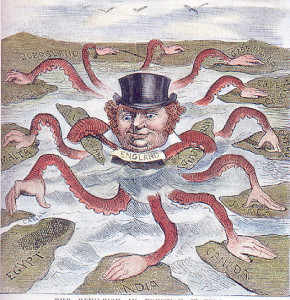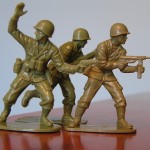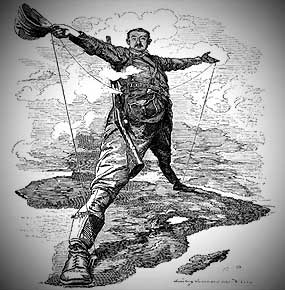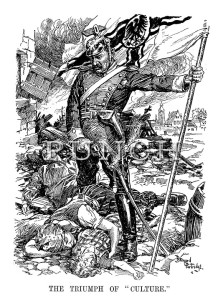 The American public is very confused right now, about what’s going on in Iraq, Syria, Yemen and Lebanon. So is Washington.
The American public is very confused right now, about what’s going on in Iraq, Syria, Yemen and Lebanon. So is Washington.
We don’t have the huge, divisive for-or-against war debate that we had a decade ago. Instead there’s an uneasy huffing and puffing from both political parties. It has the feeling of reluctant posturing, but cumulatively it sounds like the drumbeats of war.
It’s a deadly default strategy, and it’s only possible because of the absence of any sense of history.
Shock and Awe
In the USA, the 2003 invasion of Iraq is shrouded in a cloak of denial, recent though it was. The perpetrators, Bush & Cheney et al, have not only been let off the hook for the catastrophe, but are making speeches to packed conference halls, raising lusty stacks of campaign cash for their reactionary buddies, and appearing on TV in the role of esteemed geopolitical experts.
The American public has apparently failed to absorb the fact that this neo-con war — and what a con it was — transformed a high-functioning society into one of the most violent, chaotic places on Earth.
Imperial model
Making use of history is like painting on a big, wide canvas, from which we have to back up every so often to get a  reality check. The further back we stand, the more we can see.
reality check. The further back we stand, the more we can see.
Consider the Middle East a century ago, when the mighty British Empire, Uncle Sam’s role model in the world-domination department, controlled a full quarter of Earth’s land mass.(1)
After the Great War, in 1919, the Brits and their imperial allies solemnly convened in the palace at Versailles to decide amongst themselves – the Arab delegates were not, of course, invited — how to divide up the vanquished Ottoman Empire. Out of the rubble, the gentlemen from London hand-picked three oil-rich provinces, cobbled them together and created the British Protectorate of Iraq.
Nobody at the time questioned this arbitrary re-drawing of borders. It was the way victors had dealt with the spoils of war for the past 5,000 years of patriarchal history.
These days, it is not considered kosher. The Great Powers now call themselves NATO, and they explain their actions rather differently. They speak of self-determination for all nations, human dignity for all peoples, and that kind of thing.
But meaning-seekers will get a much clearer sense of what’s going on in the world right now from the unapologetic imperialism of Victoria’s day.
The English saw themselves as “taking up the white man’s burden,” in the words of their great poet-propagandist Rudyard Kipling. Western Europeans in general were utterly certain of the superiority of the “civilized” races over those of the non-white peoples they ruled over. Even the peoples of Southeastern Europe — the Balkans — were deemed semi-barbaric.
England, France and Germany saw their right to supremacy as self-evident. It was a worldview shored up by contemporary religion and science, and championed by literature.
Trans-Pacific “Partnership”
“Partnership”
We in the 21st century imagine ourselves to have a far more sophisticated sense of geopolitical ethics. In contrast to those earlier times, we are democratic, rational and humane.
We marvel at the arrogance with which an entire continent was divvied up by the rapacious European powers during the Scramble for Africa (1881-1914). We shake our heads sadly at the thought that, to the benighted Brits, it was unthinkable that the black majority would have a say in the process.(2)
Yet it seems to strike most Americans in 2015 as equally unthinkable that an Asian nation should have more influence in Asia than the USA has. Obama’s Trans-Pacific Partnership trade agreement has  been condemned for being a environmental travesty and a plutocratic power play, both of which it is. But even among its critics, few seem to have a problem with the underlying principle: that America should be able to throw its weight around in that part of the world.
been condemned for being a environmental travesty and a plutocratic power play, both of which it is. But even among its critics, few seem to have a problem with the underlying principle: that America should be able to throw its weight around in that part of the world.
We in the West seem to consider it quite normal for our president to want to “counterbalance China’s dominance in the Asian region.” A permanent military presence on the other side of the Pacific Ocean is presumed to be Uncle Sam’s right.
The Great War
I keep coming back to the First World War in an effort to understand the state of things now. The 1900-teens seem to have set in place all the key templates – geopolitical, technological, philosophical — for the modern age. It was the decade that saw Old Europe’s great empires go belly up in the dust, like giant prehistoric beasts.
 I wonder: did Mssrs. Cheney, Wolfowitz and the other architects of the war in Iraq study this period?
I wonder: did Mssrs. Cheney, Wolfowitz and the other architects of the war in Iraq study this period?
I’d love to know whether they were familiar with how, for example, the German war machine got itself into such a mess in the Ukraine. The hapless generals found themselves drawn deeper and deeper into the sordid maw of local politics, in the end struggling to uphold a Ukrainian dictatorship that they had effectively created. Why didn’t they just cut their losses, we might ask, and get out while they could?
Because Ukraine had oil. Germany wanted those oil fields.(3)
Repeating themes
Greed is an easily recognizable theme, unifying then with now. The coveting by one group of another group’s resources has been at the bottom of any number of  invasions and massacres throughout the ages, despite all the noble-sounding motives and patriotic nonsense that kings and foreign ministers come up with to bluff their subjects into choosing destruction and death over peace and life.
invasions and massacres throughout the ages, despite all the noble-sounding motives and patriotic nonsense that kings and foreign ministers come up with to bluff their subjects into choosing destruction and death over peace and life.
Then there’s the puppet-regime-as-geopolitical hedge theme. Any given decade of postwar American history reveals this one at work. Washington is notorious for picking the most disreputable and/or inept strongman it can  find, and shoring up his power in order to shore up its own.
find, and shoring up his power in order to shore up its own.
To this end, Uncle Sam supported Mobutu as a hedge against local Communists, Afghani warlords in the 1980s as a hedge against the Soviets, Egypt’s Mubarak as a hedge against regional war, the butchers who succeeded him as a hedge against Yemeni jihadi, and, of course, the Saudis as a hedge against the high price of gas.
Another fascinating theme is the Bitter-Enemy-turned-Trading-Buddy Paradox. In this one, nations that were once portrayed as the embodiment of worldly evil quietly morph into stalwart financial allies. The USA is nothing if not consistent in this regard. After fighting Germany in both world wars, Uncle Sam had no qualms about cosying up to it once it became the economic powerhouse of Europe. Nor to Japan. Nor even — a bare generation later — to Vietnam.
Divide & Conquer
If there is a Benevolent Spirit of the Recent Past, it must be itching to tap Americans on the shoulders right now, and remind us about Iraq.
About how, for example, the Iraqi populace surprised the war planners by fighting back,(4) causing the invasion to go south immediately. And about how Washington then set about fragmenting Iraq along ethnic and sectarian lines.
A more relevant piece of recent American history is hard to imagine.
In an effort to  prevent the emergence of a unified Iraqi resistance, in 2004 the Pentagon started funding militias whose identities were anchored in religion and tribalism.(5)
prevent the emergence of a unified Iraqi resistance, in 2004 the Pentagon started funding militias whose identities were anchored in religion and tribalism.(5)
It was a time-honored divide-and-conquer move. The British used it to good advantage in India, Africa and everywhere else they confiscated countries. But when Washington tried it in Iraq, the strategy backfired big time.
 “Freedom fighters”
“Freedom fighters”
Uncle Sam’s policy in the Middle East has never been motivated by humanitarian concerns, despite what the propaganda pretended (We shall rid Iraq of a cruel dictator, etc.)
For the past half-century the Pentagon has been trying to get rid of any forces in the region that would be hard for Uncle Sam to control, leftist leaders and secular humanitarians among them. Saddam Hussein was, of course, Uncle Sam’s ally back in the ’80s, when he was gassing the Kurds in northern Iraq. Back then, Washington, although fully apprised of his crimes by international monitors, looked the other way.
From 2011 to 2014, the CIA orchestrated a massive flow of military hardware into Syria to the jihadi,  whom the State Department and the media were calling “freedom fighters.” Americans more than a decade old may recall that this was the same heroic title used for the mujaheddin in Afghanistan, before they became the Taliban.
whom the State Department and the media were calling “freedom fighters.” Americans more than a decade old may recall that this was the same heroic title used for the mujaheddin in Afghanistan, before they became the Taliban.
This new crop of militants, now armed and funded by US taxpayers, became the Islamic State.
 “Will to fight”
“Will to fight”
We hear bits and pieces of all this in the American mass media. But without going into Washington’s long campaigns in the region, coverage of these developments can make no sense of them, and becomes more confused with every week that passes.
An example was the kerfuffle that arose last week featuring US Defense Secretary Ash Carter. The story was that he had put his foot in his mouth by making it sound like the Iraqi army was spineless. It was a low-level diplomatic incident that got compounded by an
 attempt to smooth things over (by Joe Biden, a man about whom everything is disingenuous, from his smile to his hairpiece.) The corporate media, true to form, dragged the discussion even further off-point.
attempt to smooth things over (by Joe Biden, a man about whom everything is disingenuous, from his smile to his hairpiece.) The corporate media, true to form, dragged the discussion even further off-point.
Here is where we risk drowning in nonsense if we don’t listen with discernment. We need to hold onto the awareness that networks like CNN are in the business of colluding with the way Washington steers the narrative. A story is written to emphasize the spurious and irrelevant aspects of what happened, while bending over backwards to avoid mentioning the relevant aspects.
are in the business of colluding with the way Washington steers the narrative. A story is written to emphasize the spurious and irrelevant aspects of what happened, while bending over backwards to avoid mentioning the relevant aspects.
In the Ash Carter case, the narrative was fashioned into an old-fashioned debate about brave-vs.-cowardly soldiers. I’m guessing this was a story line that somebody in the spin room decided would be quick ‘n’ easy for the public to grasp, triggering as it did the archetypal simplicity of a Hollywood Western.
 Context
Context
Had the news agencies genuinely wanted their listeners to understand the situation, they might have reminded us that the Pentagon itself disbanded the old Iraqi army in their purge of the Baathists; and that since then, they’ve been trying to scrape together a new Iraqi army with any locals they can find who haven’t fled with their families.
A smidgen of context would’ve made it quite easy for us listeners to understand why, amidst the havoc wreaked by this war, these young men might not feel hugely inspired to fight and die for Washington’s corrupt puppet government.
But of course that kind of context was not provided. What we saw on the news of Carter’s critique and the faux-debate that followed made it appear as if the Pentagon actually expected some sort of gung-ho teamwork from these hastily assembled soldiers, whom Uncle Sam has armed, booted up, given a badge and pointed in the direction of ISIS.
The main result of all this army-rebuilding has been the millions of dollars worth of purloined armaments that have ended up in the hands of the jihadi.
Dark truth
With ersatz information like this, the US public doesn’t get to hear about its government’s fatally maladroit operations, nor absorb their impact. By failing to frame the Ash Carter episode in context, the media misrepresented a heartrending ongoing tragedy as a throwaway item, a quick bit of programming filler.
Intelligent coverage, by contrast, of the Iraqi soldiers’ rout might have inspired a potentially incendiary learning curve for the American public, something the government and corporate media could not risk.
Karmic consequence
For Americans there are karmic consequences attached to our failure to get a meaningful reflection of the crisis happening on our watch, in our name.
What would happen if our agencies of information were to present the U.S. presence in Iraq as a sickening waste of money and lives, in an endless and unwinnable war?(6) On a political level, it would allow Americans to make informed choices. On a spiritual level, it would help us learn the lessons of Saturn (karma).
But we don’t have to wait for the media to transform itself, any more than we should wait for our irredeemably corrupt political system to produce leaders with conscience and soul. As citizens of this country and this era, we owe it to our self-actualization to discover what’s going on in the group whose collective karma we share. And to find our place within it accordingly.
As meaning-seekers, it falls to us to face all sorts of truths, no matter how dark.
Notes
1 James (Jan) Morris’ Pax Britannica trilogy (1968–78) lays out the basic colonial strategy. The awe-inspiring English navy, unparalleled in the world, would sail to a non-white continent,  securing the ports first. In order to protect the ports, they’d have to acquire the hinterlands. To protect the trade routes, they’d secure military bases. One valley led to the next, “from every sea to the other shore.”
securing the ports first. In order to protect the ports, they’d have to acquire the hinterlands. To protect the trade routes, they’d secure military bases. One valley led to the next, “from every sea to the other shore.”
2 The European public was fascinated by the Boer Wars (1899 –1902). Watching from afar, they divided down into two sharp factions, each convinced that God was on its side. One faction rooted for the Boers, ancestors of the Dutch immigrants who had colonized part of southern Africa; the other faction rooted for the bold and powerful Brits, who had colonized the rest of the region. None supported the indigenous population.
 It was taken for granted – on this alone the British and Boers had always agreed – that the native population should not have the right to vote, let alone the rights to their own diamonds and gold (as George Orwell wrote of Kipling after his death, the rabidly imperial poet never acknowledged “that an empire is primarily a money-making concern.”) Or, for that matter, the right to be left alone.
It was taken for granted – on this alone the British and Boers had always agreed – that the native population should not have the right to vote, let alone the rights to their own diamonds and gold (as George Orwell wrote of Kipling after his death, the rabidly imperial poet never acknowledged “that an empire is primarily a money-making concern.”) Or, for that matter, the right to be left alone.
3 The combatants in the Great War realized how useful oil was for their military materiel. Ever since, oil has been the hidden agenda underlying superpower foreign policy in the Middle East. See Adam Hochschild, To End All Wars.
4 It says a lot about the war designers of this invasion that they didn’t expect resistance. I imagine Bush adviser Kenneth Adelman really believed it when he said it’d be “a cakewalk.” Military history offers many examples of this particular miscalculation. Notoriously, when the German army  marched into Belgium in 1914, they were completely taken off guard, and deeply annoyed, that the plucky little Belgian army had the gall to fight back. This threw off their impeccably detailed, timed-to-the-minute logistics, delaying their invasion of France. A big part of the reason they committed those notorious atrocities against Belgian civilians, it is said, was because of their intense irritation at having their itinerary messed up.
marched into Belgium in 1914, they were completely taken off guard, and deeply annoyed, that the plucky little Belgian army had the gall to fight back. This threw off their impeccably detailed, timed-to-the-minute logistics, delaying their invasion of France. A big part of the reason they committed those notorious atrocities against Belgian civilians, it is said, was because of their intense irritation at having their itinerary messed up.
5 According to peace activist Brian Becker, the plan cooked up by Paul Bremer was that a Shiite would be Prime Minister, a Kurd would be President, a Sunni would be the Speaker of the National Assembly.
6 See Brian Becker’s analysis.




